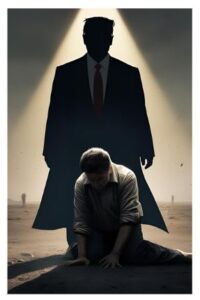
[There is justified concern that the Trump Administration is descending into authoritarian rule. Without functioning constitutional guardrails he is able to exercise unfettered dominance and control. The current makeup of the Congress essentially means that only the courts can stop him from seizing illegitimate power. Few of us imagined we would one day descend to the perilous level of electing a rogue president.
We speak of Trump as an “authoritarian.” But the term applies equally to people looking for the psychological comfort of an “all the answers” leader. ]
German academic T. W. Adorno was the lead researcher of the first major analysis of social conditions that give rise to populations overly enamored with authority figures.1 The researchers, some of whom had escaped from Europe at the start of World War II, traced the origins of a multitude of personality traits, including anti-Semitism, “susceptibility to antidemocratic propaganda,” ethnocentrism (judging others by one’s own values), and predispositions toward fascism. The rise of the Nazi Party and its wide acceptance even among well-educated Germans was the puzzle they wanted to solve.
Their questions are still relevant. Are certain kinds of citizens susceptible to appeals based on authority, especially “official” sources? Are some types of audiences too willing to ignore the natural ambiguities of everyday life in favor of the rigid ideological certainties of a demagogue? And what psychological needs are satisfied by cult-like allegiance is given to a leader? Think of any leader who sees their position as allowing the extra-legal extension of laws or institutions to punish perceived enemies. In this view, one can ignore constitutional mandates that would limit powers. The perceived need to purge alleged enemies is greater.
The original concept of authoritarianism focused equally on followers who are predisposed to submissive attitudes that mesh well with a dominating leader. A paper and pencil questionnaire called the F-Scale inventory probing for signs of “authoritarian submission” and “uncritical attitudes toward idealized moral authorities.” It consisted of claims, such as the ones listed below, to which a respondent would agree or disagree. Agreement gave a person a high F (Fascism) score.
“Obedience and respect for authority are the most important virtues children should learn.”
“Every person should have complete faith in some supernatural power whose decisions will be obeyed without question.”
“What this country needs most, more than laws and political programs, are a few courageous, tireless, devoted leaders in whom the people can put their faith.”
The researchers found that anti-Semitism, rigidity, ethnocentrism, and undue respect for power tended to cluster within many of the same people. They theorized that the clustering was tied to styles of family life. They also learned that authoritarianism can be identified in segments of almost any population. Some people may be psychologically hardwired to seek a “place” in a clearly defined social order led by a dominating leader. In Congress, for example, many GOP members seem happy to relinquish their constitutional responsibilities in favor of the President. Right now, few committees led by Republican chairpersons are engaged in what is usually the routine work of oversight of executive actions.
As a researcher on the psychology of identification, it seems evident that–with exceptions–authoritarians tend to have a diminished capacity for social intelligence. Low social intelligence typically includes low levels of empathy for others, lower self-esteem, low self-monitoring (an inability to notice how one’s own presence effects others), attraction to charismatic individuals, and an aversion to social complexity and pluralism.
Our quickly atomizing culture unfortunately feeds some of these traits. Recent election results are a reminder that many among us want simple and magical answers to entrenched problems: all the better if the explanations include scapegoating others. We have lived through a seemingly endless number of false alternate narratives told and retold about stolen elections, pedophile Washington elites, dead voters who managed to cast ballots, or Social Security cheats. Presently the political right finds receptive citizens with similar fears. Low-knowledge voters–and there are many–don’t have enough solid information to quell their imaginations. As a nation we need to get a whole lot smarter about weighing the claims of leaders who are willing to trade the complexities of modern life for dubious certainties.
![]()
1The Authoritarian Personality. New York: Harper and Row, 1950.


 A recent Newsweek poll notes that forty-nine percent of respondents said they view Musk unfavorably, compared to only 39 percent who view him positively. Those are not good numbers for a high profile head of a company who has taken a detour to help fire some 140 thousand federal workers.
A recent Newsweek poll notes that forty-nine percent of respondents said they view Musk unfavorably, compared to only 39 percent who view him positively. Those are not good numbers for a high profile head of a company who has taken a detour to help fire some 140 thousand federal workers.